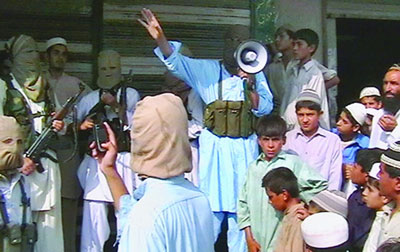Why would anyone carry out such a horrible crime as the terrorist attacks on the World Trade Center and the Pentagon? How should the United States respond? What would be the likely results of a military attack on Afghanistan ?
Searching for answers to these and other questions, more than 200 students, faculty, and staff gathered in Gamble Auditorium on September 19 for “After September 11: The Hard Questions,” a teach-in sponsored by the Weissman Center for Leadership and the Office of the Dean of the College and the Dean of Faculty.
Offering their perspectives were three authorities on the situation: Nafisa Hoodbhoy, a former journalist with an English-language daily in Pakistan, now producing programs for WFCR radio, Michael Klare, the Five College professor of peace and world security studies, and Sohail Hashmi, Alumnae Foundation Chair in the Social Sciences and an associate professor of international relations at MHC.
Moderating the discussion was Kavita Khory, associate professor of politics at the College.

Taking pains to condemn the terrorists’ actions, the panelists explored the events that led up to those acts, and generally agreed that the United States would have nothing to gain by waging war in Afghanistan.
The nation seems to be moving ahead with a military response, Klare said. “The machine has been set in motion,” he said, warning that a military campaign would be “a disastrous course of action that will lead to certain deaths [in the Muslim world] and stir up more hatred of us.”
A better alternative, he argued, would be pursuing and prosecuting Osama bin Laden and his accomplices as criminals in an international court.
Klare said the seeds of the current conflict were sown in 1945, when the United States pledged to protect the royal family of Saudi Arabia against external and internal threats in exchange for unfettered access to Saudi oil.
That pledge has led to United States-supported suppression of free speech in Saudi Arabia, as well as a growing military presence that has fanned opposition among Muslims angered by the perceived defilement of Mecca and other holy places.
“There is absolutely no sense in bombing Afghanistan, because this is a country that is already in the Stone Age. It has nothing,” Hoodbhoy said. Military action, she said, would likely push Muslim moderates into the camp of the hard-line fundamentalists, and “cause more sympathy for a regime which people are sick of and would like to be rid of.”
Hashmi said that if the terrorists are carrying out a holy war, they probably see it as a defensive action against the expansion of the West’s power and influence in the Middle East.
Others, including many non-Muslims, share their views, he said, but split with the terrorists over the method of addressing those concerns. Although the Qur’an teaches that killing one innocent person is like killing all humanity, Hashmi said, the hard-liners have taken the position that no one in the United States is innocent in this struggle—a justification for mass murder.
The United States, he said, should not respond in kind. “The idea of an endless series of events that could be the source of grievance is one that would perpetuate the cycle of attack and counterattack,” he said.
The teach-in was one in a series of events by which the College is responding to the attacks of September 11.
On October 17, at 7:30 pm in Hooker Auditorium, Michael Ignatieff, director of the Carr Center for Human Rights Policy, will speak on the relation between human rights and terrorism.
Source: Mt Holyoke College


I can already tell that’s gonna be super helpful.